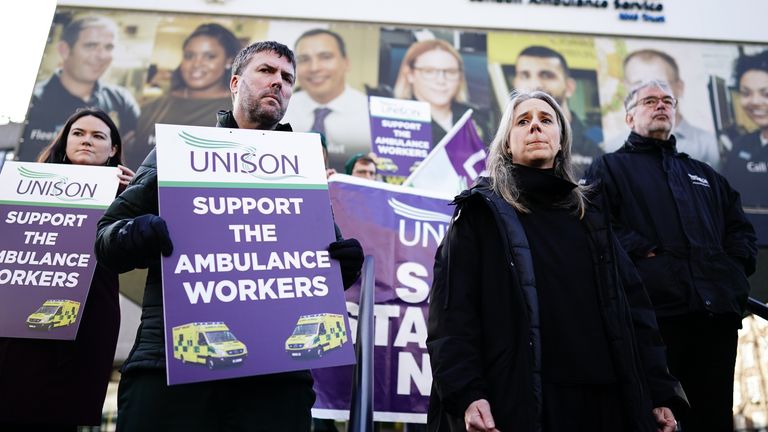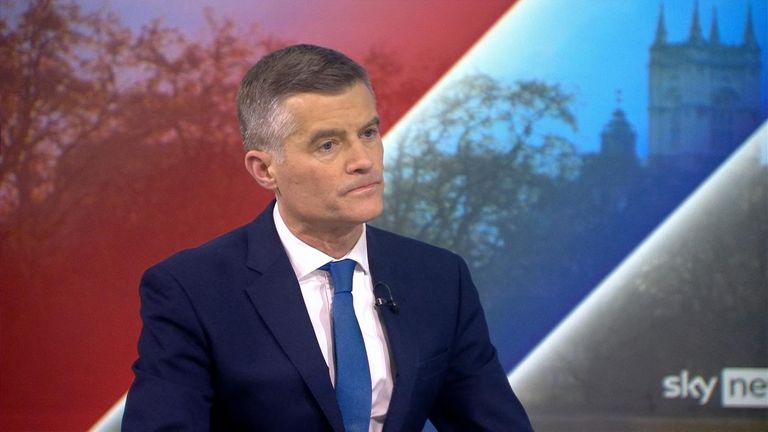Teachers’ union could be next to announce strike as wave of industrial action continues | UK News
Thousands of teachers could be set to walk off the job as the National Education Union (NEU) prepares to announce the result of a strike ballot on Monday.
The NEU has said walkouts could begin at the end of the month after more than 300,000 teachers and support staff were asked to vote in a dispute over pay.
The union will have to give two weeks’ notice of any industrial action.
A ballot of members of the NASUWT teachers union last week failed to reach the 50% turnout threshold, although nine in 10 of those who did vote backed strikes.
The NEU announcement will come as the wave of industrial action which has swept across the country for months will continue this week.
Nurses across England will walk out on Wednesday and Thursday.
The Royal College of Nursing (RCN) has warned that if progress is not made in negotiations by the end of January the next set of strikes will include all eligible members in England for the first time.
The government continues to insist that pay claims are unaffordable and is sticking to its line that wage rises should be decided by pay review bodies.
Health unions are refusing to submit any evidence to the NHS pay review body for the 2023/24 pay rise until the current dispute is resolved.
Meanwhile, leaders from the GMB union will meet on Monday to decide whether to call more strikes among their ambulance members because of the lack of progress in talks.
Any decision is likely to be announced later in the week.
On Wednesday, Unison members at the Environment Agency will go on strike in a dispute over pay.
Talks will continue between rail unions and train operators in a fresh attempt to resolve the long-running row which has led to a series of strikes since last summer.
Both sides say they are working towards a revised offer.
It comes as the Public and Commercial Services union (PCS) is pressing ahead with a strike on February 1 by 100,000 civil servants which will have an impact on governments, driving test centres, museums, ports and airports.
Read more:
Lack of cover for category two ambulance calls put public safety at risk, health secretary says
Rail companies given ‘permission’ by transport secretary to make new offer to unions this week
The TUC is organising a series of protests on 1 February against the government’s controversial proposed new law on strikes.
Planned legislation aimed at ensuring minimum levels of service during strikes will receive its Second Reading in parliament on Monday.
A demonstration will be held outside Downing Street to protest against the government’s move.
PCS members working as legal advisers and court associates in more than 80 courts across England and Wales are also to take further strike action in a long-running dispute about a case management system called Common Platform.
Around 300 PCS members will take action on 21 January and 28 January.
Click to subscribe to the Sky News Daily wherever you get your podcasts
PCS general secretary Mark Serwotka said: “As long as managers continue to ignore our members, our members will continue to resist the unworkable Common Platform system and fight for the integrity of the entire justice system.”
This week’s industrial action will take place after the government was accused of attempting to “steamroller” through new legislation on strikes amid mounting anger over the “spiteful” measure.
A bill on ensuring minimum levels of service during industrial action will receive its Second Reading in parliament on Monday as part of ministers’ response to months of strikes and more walkouts due in the coming weeks.
Labour said it will oppose the legislation and any attempts to fast track it through parliament without proper scrutiny.
The TUC said the planned law would give ministers sweeping new powers that restrict the right to strike.

